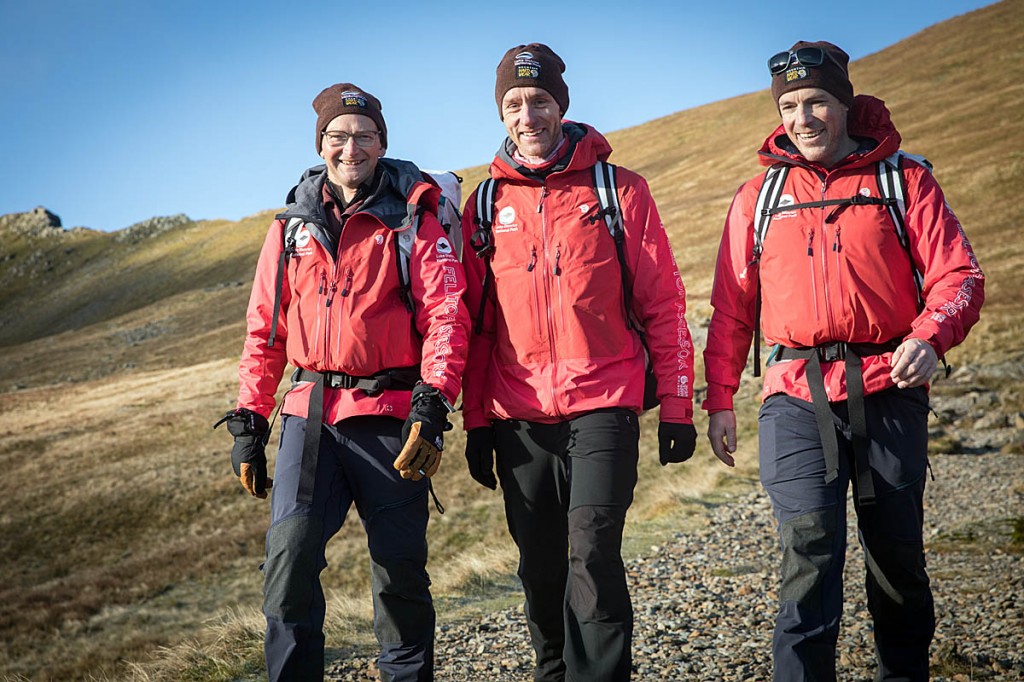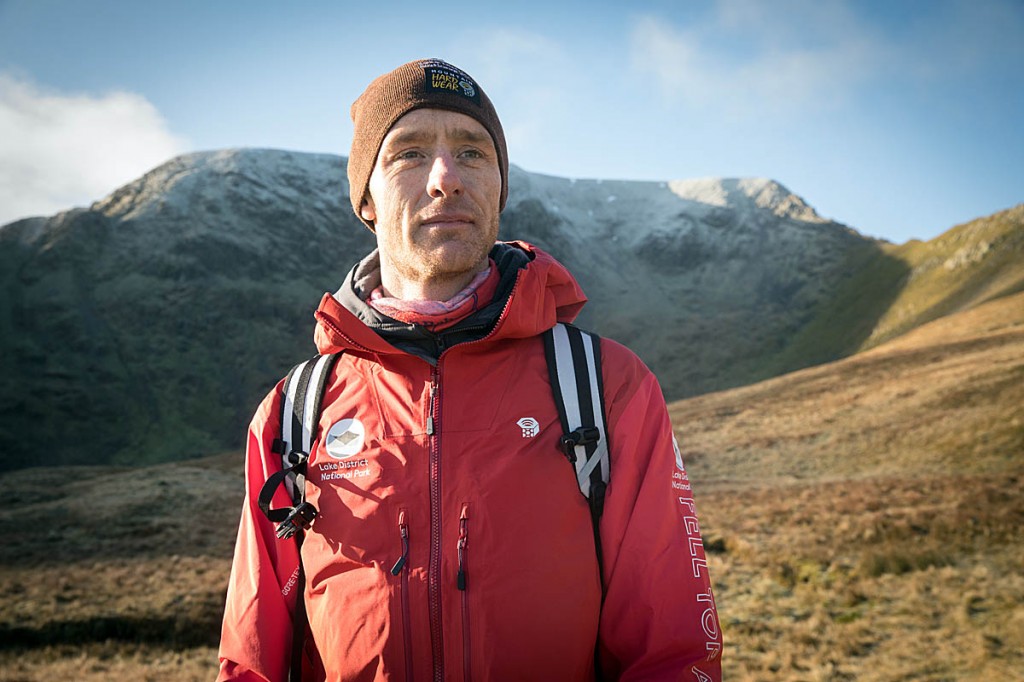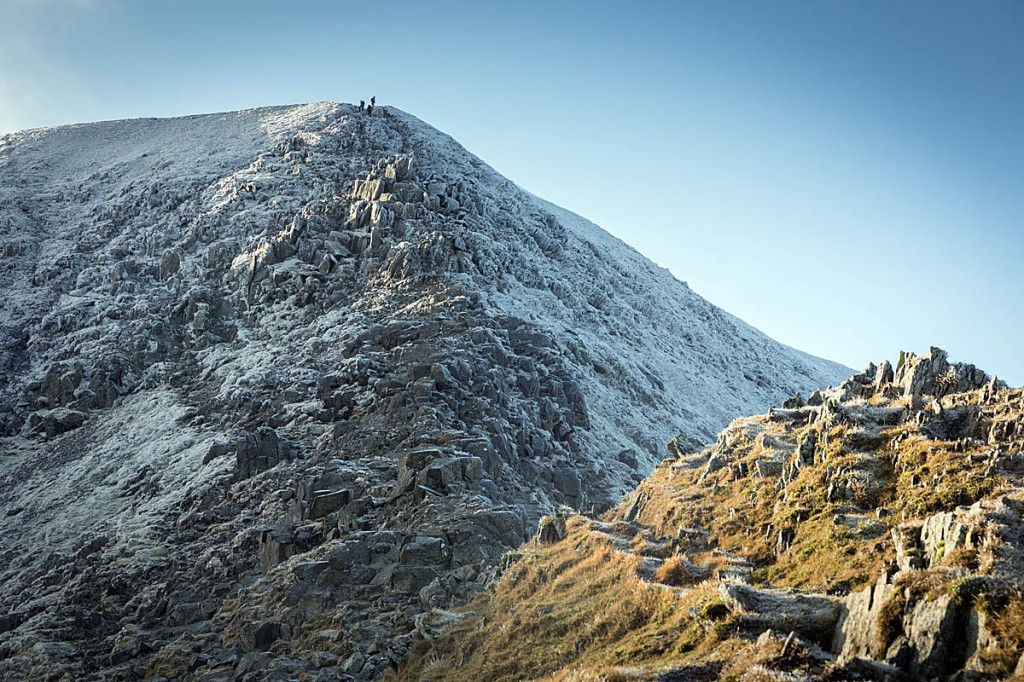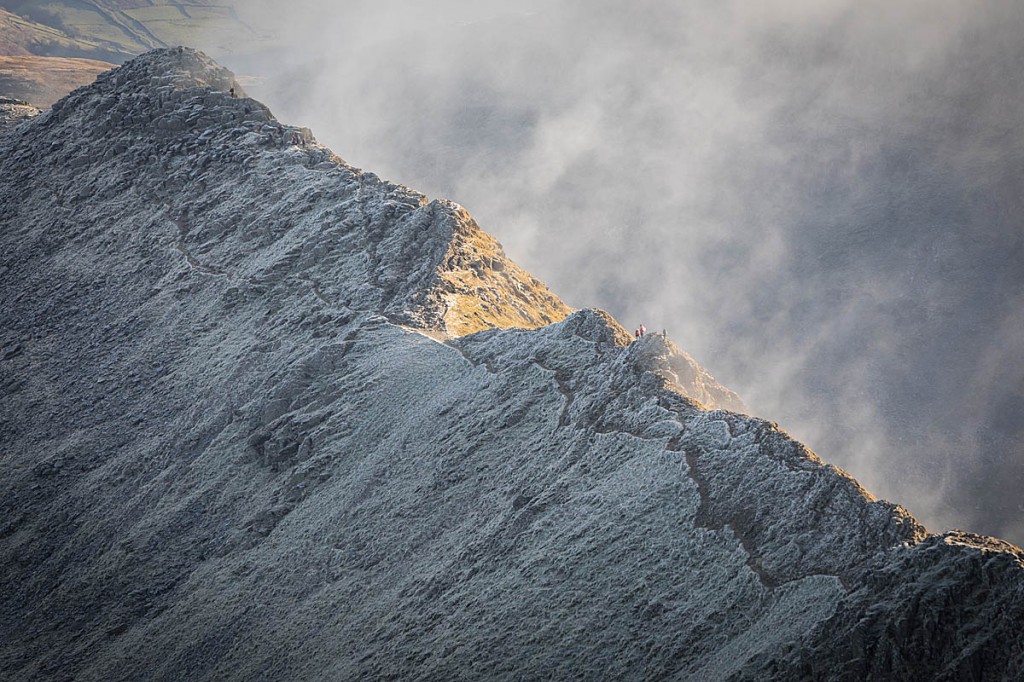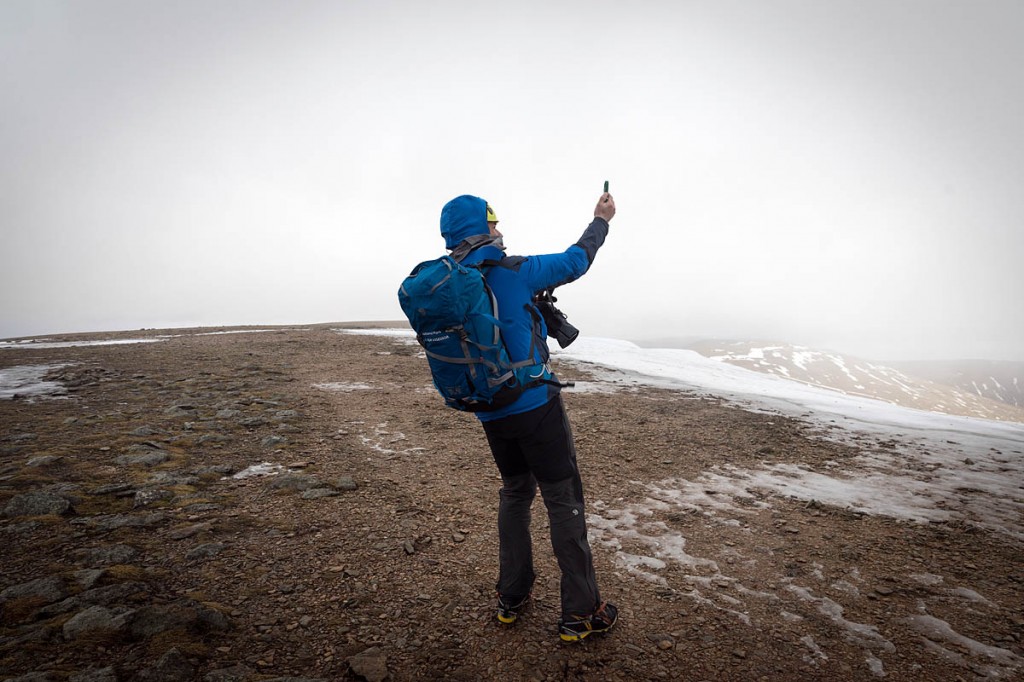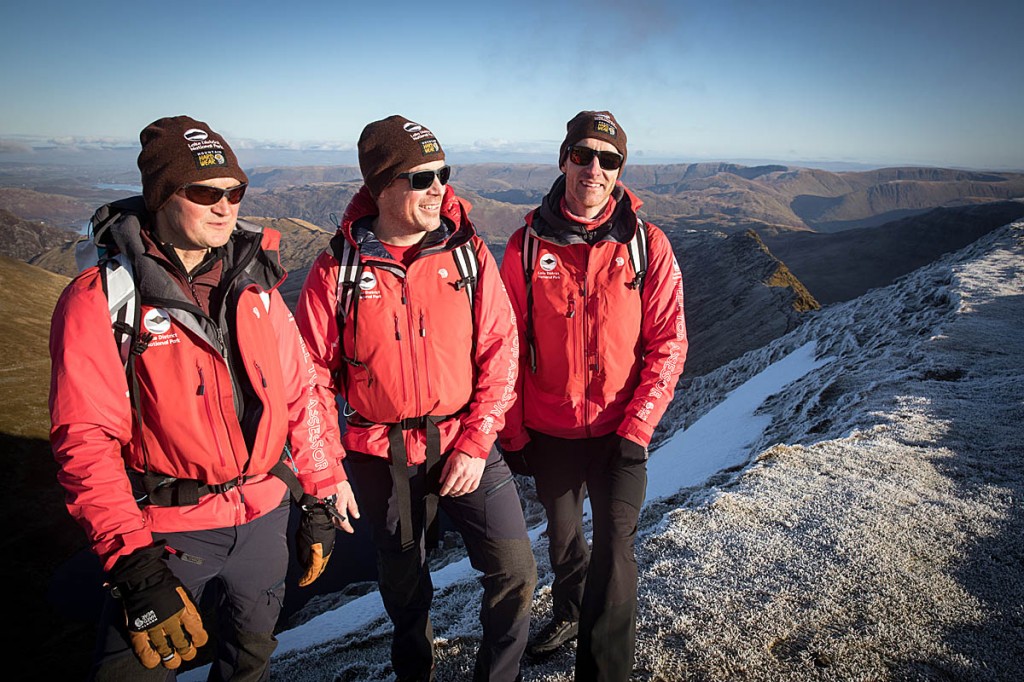December marks the beginning of meteorological winter; it’s also when winter officially comes to the Lake District with the start of the felltop assessor service.
Every day, from 1 December until Easter, one of the three men employed by the national park authority will make the ascent to the summit of Helvellyn to take readings and observations for the Weatherline service.
The assessors provide boots-on-the-ground evaluation of the state of the terrain and weather readings to help hillgoers plan their mountain excursions during the winter months.
For the past few years, the assessors have also run winter-skills courses for members of the public, the revenue from which enables the service to be self-funding.
Grough joined the three men, Jon Bennett, Zac Poulton and new recruit Wes Hunter at the launch of the service on a near perfect day on Helvellyn. On a cold, crisp, sunny day, with just an odd wisp of mountain cloud brushing the toothy spikes of Striding Edge, we made our way to Red Tarn in the company of the three assessors, a regional television reporter, Lake District National Park Authority staff and representatives of the outdoor brands who clothe and equip the assessors.
With Helvellyn looking resplendent with an icing sugar topping of rime, the three assessors gathered for photos and interviews.
The park authority advertised the post of the third assessor earlier in the year when Graham Uney decided to step down from the job to concentrate on his own mountaineering and training activities.
The Lake District national park received about a hundred applications for the position, viewed by many outdoor enthusiasts as a dream job. This was whittled down to about 30 people who had the required winter mountaineering qualifications. A shortlist of six was drawn up and, after face-to-face interviews and on-the-hill evaluations, 39-year-old Cumbrian man Wes Hunter was announced as the latest felltop assessor.
Wes explained he has the Winter Mountaineering and Climbing Instructor award, a qualification that includes proven ability to lead and climb winter routes graded III or above, logged days instructing, plus also holding the Winter Mountain Leader and Mountaineering and Climbing Instructor awards.
He lives near Cockermouth on the north-western fringe of the Lake District. “I was brought up in the Lakes; I went to school in Keswick,” he said. He knows the Lakeland fells well, but has wider experience too. “I’ve lived in lots of different areas in the Lakes. I’ve lived in other places; worked in other places: north Wales, Scotland, the French Alps and I’ve done a lot of travelling and climbing on top of that.”
Although the felltop assessor service starts on Sunday, Wes’s first stint begins on Wednesday. He said: “I’ve been aware of the felltop assessors for a long time and I use the Weatherline service every winter and during the summer as well and it has always struck me as a unique job. A lot of the work I do is quite seasonal, the majority of the work being in the summer months and winter can be trickier to find work.
“To be able to have a job like this that fills in the winter months is just fantastic.
“I’m doing five-day blocks, five consecutive days in every 15, so I’ll get a good rest after it as well.
“I’m looking forward to just being outside every day in different light, different weather conditions; having days out with people, introducing them to the winter environment; but also the opportunity to get out on my own and explore some of the more esoteric areas of Helvellyn.
“A lot of the time when you come up, working especially, you might be taking routes that you do quite frequently, so it will be nice to get off the beaten track a bit and explore the nooks and crannies.
“It will depend on what the conditions are like and just making decisions on the day. A lot of the time when I’m just taking the readings on my own, I’ll probably approach from the other side, from Thirlmere, just because it’s not as big a drive round. I’ll just try and choose different routes each day.”
The three assessors, as well as gathering data and observations on the mountain, act as ambassadors for the park authority, but Wes is keen to stress they are not ‘mountain police’.
He said: “I think there are people who really look up to the national park authority and the felltop assessors and will approach you and ask advice; other people might not want that so much and might want to be left to their own devices, so it’s kind of a personal thing.
“If I did see something that I thought, that looks a bit iffy, I might go along and get a sense of what’s going on. If I see something that’s imminently dangerous, of course, we’ve all got a duty to do that, not just felltop assessors. We’ve all got a duty of care to one another.
“If it’s obvious someone really doesn’t want to be interfered with, of course, we have to leave them to it, to their own devices, and maybe just make some suggestions. We’re not here to enforce anything by any means. Our role is to give advice and hope people have the most productive day they can but also with safety in mind.
“Keeping them safe is a priority.”
The information the three assessor provide is disseminated through the Weatherline website and on social media. It helps walkers, mountain bikers and climbers make informed decisions on where, or even whether to go on the Lakeland fells.
“We take fairly basic readings,” Wes said. “We’ll get into a fairly prominent position. The top of Helvellyn, for instance, is very exposed to wind, and the top of the ridges. We’ll be taking measurements of the wind speed and direction; what the strongest gusts are; working out windchill.
“Then just making general observations that will help people: what ground conditions are like; maybe a few bits of information that will be useful to climbers venturing up some of the gullies or climbs on the buttresses.”
During severe winter weather, one problem the three men may face is actually getting to the mountains if road conditions prevent access to the Helvellyn area.
Wes said: “If we can’t get to the start point because of the weather, then obviously we can go up other hills. It might be, for me driving across from Cockermouth, I might be able to get to Threlkeld and go up Blencathra which would make a lot of sense because you still get a general idea of what conditions are like across the region.”
The development of the winter skills courses has enabled hillwalkers to gain knowledge and learn techniques that will help them evaluate the mountains and increase their safety on the hill during the winter months. It’s also a valuable source of revenue for the park authority at a time when budgets are under severe pressure. The courses have enabled the felltop assessor service to become largely self-funded.
Wes said: “A lot of our work will be on the winter skills courses. We’ll be running open courses with up to six people. They’ll all be tailored to what individuals need. We’ll also be doing one-to-one and one-to-two days where people can just head out with us and you can really tailor things to what people want if there’s only one or two of them.”
After leaving the three men to embark on a filming and photography session on Striding Edge, I headed up to the summit via a frosty Swirral Edge to find plenty of walkers and a few mountain bikers making the most of a stunning winter mountain day with the Lake District fells bathed in sunshine and crystal clear views of the national park’s peaks, and beyond to the Solway Firth and Galloway Hills, north Pennines and Morecambe Bay. I met them again on the summit of Helvellyn where more filming work followed, including drone shots of the three ‘Men in Red’ striding purposefully across the plateau.
And on Sunday, the real work begins. As Wes said: “There’s a lot of variety in the job, which is one of the things I really will enjoy about it.”
The assessors’ reports, plus a weather forecast, along with details of the winter skills courses, can be found on the Weatherline website.
